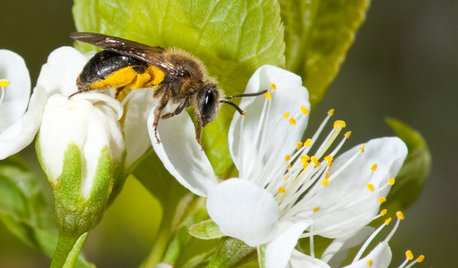proactive spraying?
aptz
9 years ago
Related Stories

BATHROOM DESIGNHow to Design an Accessible Shower
Make aging in place safer and easier with universal design features in the shower and bathroom
Full Story
MOST POPULARHow to Get Rid of Those Pesky Summer Fruit Flies
Learn what fruit flies are, how to prevent them and how to get rid of them in your home
Full Story
MONTHLY HOME CHECKLISTSYour Checklist for Quick Houseguest Prep
Follow these steps to get your home ready in a hurry for overnight visitors
Full Story
FEEL-GOOD HOMEThe Pros and Cons of Making Your Bed Every Day
Houzz readers around the world share their preferences, while sleep and housekeeping experts weigh in with advice
Full Story
LIFEHow to Outsmart Backyard Critters
Learn to think like a raccoon, skunk or squirrel to keep your home safe and your garden intact
Full Story
BATHROOM DESIGNWater Damage Spawns a Space-Saving Bathroom Remodel
A game of inches saved this small New York City bathroom from becoming too cramped and limited
Full Story
REMODELING GUIDES9 Hard Questions to Ask When Shopping for Stone
Learn all about stone sizes, cracks, color issues and more so problems don't chip away at your design happiness later
Full Story
ORGANIZINGStorage Tricks for Those Who Love Their Stuff
Get ideas for clearing the decks without getting rid of all the lovely things you want to keep around
Full Story
KITCHEN DESIGNKitchen of the Week: Updated French Country Style Centered on a Stove
What to do when you've got a beautiful Lacanche range? Make it the star of your kitchen renovation, for starters
Full Story
GARDENING GUIDESInvite Mining Bees to Your Garden by Planting Their Favorite Plants
Look for mining bees (Andrena) pollinating woodland wildflowers in U.S. gardens this spring
Full StoryMore Discussions






ltilton
gardenper
Related Professionals
Marina Landscape Architects & Landscape Designers · Oatfield Landscape Architects & Landscape Designers · Billerica Landscape Contractors · Broomfield Landscape Contractors · Concord Landscape Contractors · Dinuba Landscape Contractors · Dixon Landscape Contractors · Fair Lawn Landscape Contractors · Mendota Heights Landscape Contractors · New Baltimore Landscape Contractors · Pacifica Landscape Contractors · Pahrump Landscape Contractors · Peoria Landscape Contractors · Soddy Daisy Landscape Contractors · Vadnais Heights Landscape Contractorsloribee2
theforgottenone1013 (SE MI zone 5b/6a)
digdirt2
woohooman San Diego CA zone 10a
loribee2
rnewste
terry_neoh
seysonn
planatus